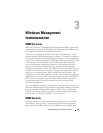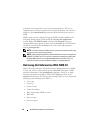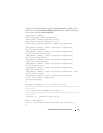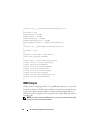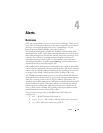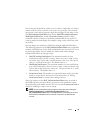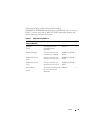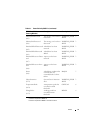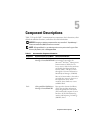
32 Alerts
The system network interface card (NIC) and basic input/output system
(BIOS) support ASF 2.0. If the BIOS allows for any ASF 2.0 configuration,
then the BIOS settings are exposed through the Microsoft
®
Windows
®
Management Instrumentation (WMI) by OMCI.
ASF Alerting
In previous versions of OMCI, environmental alerts were sent as Desktop
Management Interface (DMI) alerts. With the introduction of ASF, the
environmental alerts are handled by the ASF NIC. ASF monitors the
environmental probes at a very low level and sends out a Platform Event Trap
(PET) when an event occurs. Where applicable, OMCI notifies the local user
of the alert. For information on which PET a specific model of Dell system
supports, see the system's Setup Guide.
ASF is a DMTF management standard that specifies
"pre-operating system"
or
"operating system-absent" alerting techniques. The standard is designed to
generate an alert on potential security and fault conditions when the
operating system is in a sleep state or the system is powered off. ASF is
designed to supersede previous operating system
-absent alerting
technologies.
WMI Alerting
Local alerting involves displaying user messages and writing to the Windows
event log. Remote alerting is accomplished through WMI indications. When
OMCI detects an event, it generates an alert, which can be transmitted
through the WMI service to a remote management application that is
subscribed to that alert type.
When an alert is generated, OMCI supports three types of notification:
• NT event log
•Remote
• Console
In OMCI, each type of event
(for example, CurrentProbe, TemperatureProbe,
Smart, and so on)
that gets logged is provided with an unique event ID
number. The events have unique IDs to allow log scraping; this way you can
programmatically look at the event log and determine what OMCI events have
occurred.




